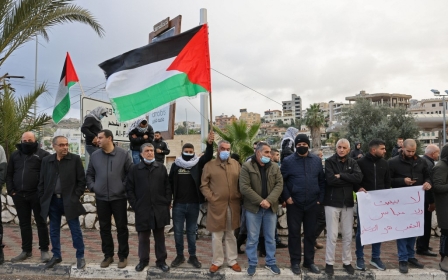Israel approves new settlements in Negev following deadly attack

Israel has approved the construction of five new settlements in the Negev desert, days after four people were killed in an attack in the nearby Beersheba settlement.
According to the resolution, which was approved by the Israeli cabinet on Sunday, the settlements will consist of one set aside for Bedouin, one as a kibbutz, and three as "communal" villages.
The resolution gives the World Zionist Organisation's Settlement Division the power to recruit residents to move to the new settlements.
Interior Minister Ayelet Shaked and Construction and Housing Minister Zeev Elkin have said they intend to have admissions committees vet applicants, a move that was criticised by Environmental Protection Minister Tamar Zandberg of the centre-left Meretz party, according to Haaretz.
The ministers described the new settlements as "a significant step in strengthening settlement in the Negev with an emphasis on the eastern Negev, which is a region of national strategic importance".
Stay informed with MEE's newsletters
Sign up to get the latest alerts, insights and analysis, starting with Turkey Unpacked
The announcement comes a few days after four Israelis were killed in a suspected stabbing and car ramming attack in nearby Beersheba.
The four victims, two women and two men, died on Tuesday after a series of attacks that began outside a shopping mall in the city of Beersheba. The attacks were carried out by a Palestinian citizen of Israel from nearby Hura town.
There are almost 300,000 Palestinians who hold Israeli citizenship and who live in dozens of villages in the Negev.
Some 100,000 of them live in unrecognised villages and are denied any infrastructure or support from the government.
There are no means of transportation, no roads, no schools, and Israeli authorities don't collaborate with local leadership.
Last week, Zeev Elkin, the housing minister, announced that the Jewish National Fund (JNF) will resume a controversial forestation plan in the Negev in close proximity to Palestinian towns.
In December and January, hundreds of Palestinians protested against the JNF forestation plan, which they claim is a pretext to push them out from their lands to make way for new Jewish towns. The plan was temporarily put on hold.
"This will be at our expense, as if there are no Arabs living in the Negev," said Juma al-Zabarqa, a former Knesset member and coordinator of the Higher Orientation Committee for Arabs in the Negev.
"We constitute 32 percent of the population in the Naqab [Negev], but they plan as if we do not exist," he told Middle East Eye.
Middle East Eye delivers independent and unrivalled coverage and analysis of the Middle East, North Africa and beyond. To learn more about republishing this content and the associated fees, please fill out this form. More about MEE can be found here.





